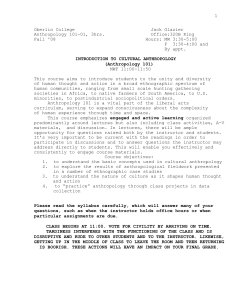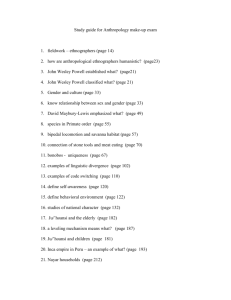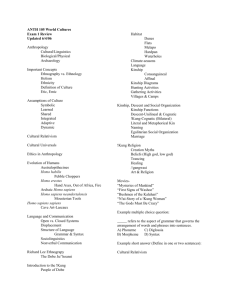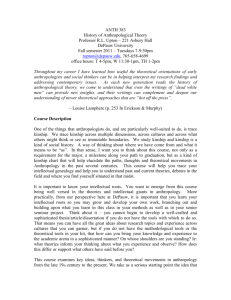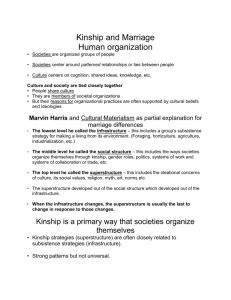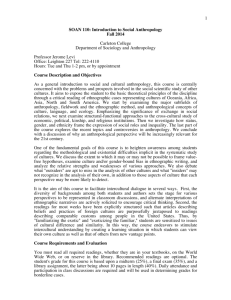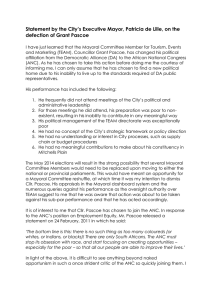schedule of topics and readings
advertisement
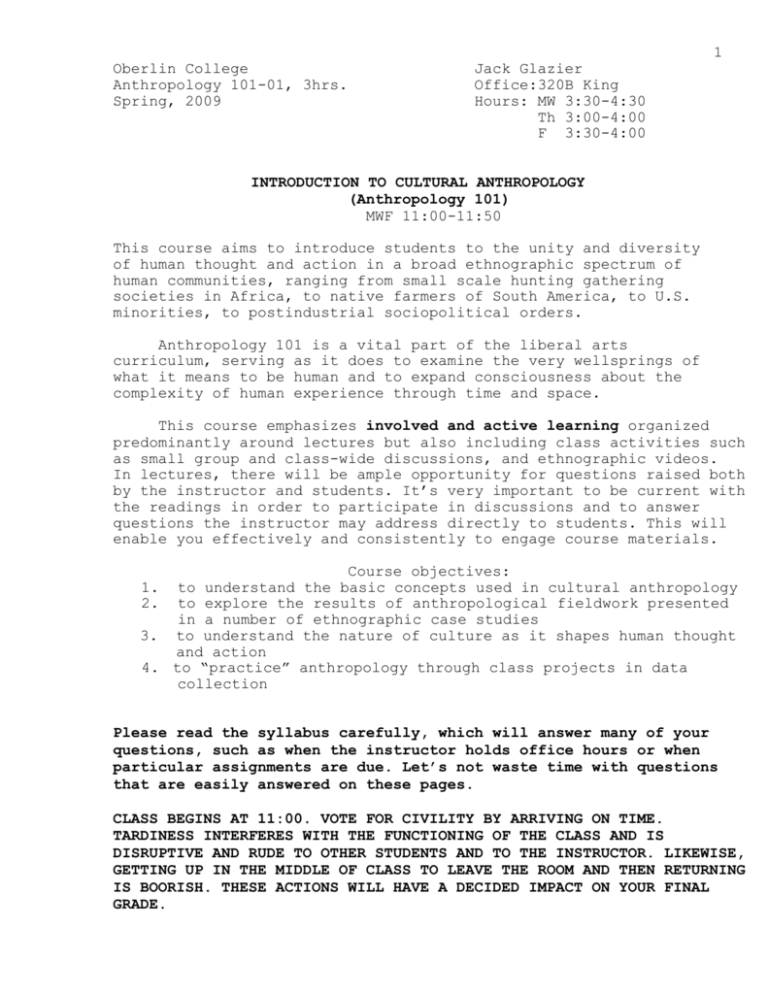
1 Oberlin College Anthropology 101-01, 3hrs. Spring, 2009 Jack Glazier Office:320B King Hours: MW 3:30-4:30 Th 3:00-4:00 F 3:30-4:00 INTRODUCTION TO CULTURAL ANTHROPOLOGY (Anthropology 101) MWF 11:00-11:50 This course aims to introduce students to the unity and diversity of human thought and action in a broad ethnographic spectrum of human communities, ranging from small scale hunting gathering societies in Africa, to native farmers of South America, to U.S. minorities, to postindustrial sociopolitical orders. Anthropology 101 is a vital part of the liberal arts curriculum, serving as it does to examine the very wellsprings of what it means to be human and to expand consciousness about the complexity of human experience through time and space. This course emphasizes involved and active learning organized predominantly around lectures but also including class activities such as small group and class-wide discussions, and ethnographic videos. In lectures, there will be ample opportunity for questions raised both by the instructor and students. It’s very important to be current with the readings in order to participate in discussions and to answer questions the instructor may address directly to students. This will enable you effectively and consistently to engage course materials. Course objectives: to understand the basic concepts used in cultural anthropology to explore the results of anthropological fieldwork presented in a number of ethnographic case studies 3. to understand the nature of culture as it shapes human thought and action 4. to “practice” anthropology through class projects in data collection 1. 2. Please read the syllabus carefully, which will answer many of your questions, such as when the instructor holds office hours or when particular assignments are due. Let’s not waste time with questions that are easily answered on these pages. CLASS BEGINS AT 11:00. VOTE FOR CIVILITY BY ARRIVING ON TIME. TARDINESS INTERFERES WITH THE FUNCTIONING OF THE CLASS AND IS DISRUPTIVE AND RUDE TO OTHER STUDENTS AND TO THE INSTRUCTOR. LIKEWISE, GETTING UP IN THE MIDDLE OF CLASS TO LEAVE THE ROOM AND THEN RETURNING IS BOORISH. THESE ACTIONS WILL HAVE A DECIDED IMPACT ON YOUR FINAL GRADE. 2 Honor Code: Suspected violations of the Honor Code will be referred to the student-run Honor Code Committee as stipulated by the rules of the College. A student found by the Committee to be in violation of the Honor Code will be subject to the Committee’s sanctions. The instructor will also give an automatic F for the course to violators. If anything is unclear about expectations of the Honor Code, please ask. The following web address will provide official details about the Honor Code and Honor System: http://oncampus.oberlin.edu/@@BB40F2725B2328DB25B2032EC4F253B1/co urses/1/SL-dean/content/_195488_1/Revised Honor Code and Honor System.pdf COURSE REQUIREMENTS AND EVALUATION 1 Two connection essays (4 pages maximum) each essay 15%,x2 30% Due dates: On or Before Mar 16. Everyone is required to hand in a connection paper ON THIS DATE OR BEFORE. The second connection paper may be handed in at any time before May 1 Late papers are not acceptable, nor are electronic submissions for this or any other written assignment. Active and engaged learning requires that papers are fully proofread and carefully prepared. The kind of grade you would like can only be forthcoming if the paper is well-organized, clearly written, and error-free. 2. Choice of one of two “hands on” projects 25% A. Kinship and Genealogy Paper due April 9 For this exercise students will pair up to prepare and compare personal genealogies and to interview each other toward the end of writing an essay that compares family and kinship in these two cases and draws on pertinent readings. Each student may submit either an individual paper based on the genealogy and interviews or a collaborative paper written in cooperation with his or her partner. Paper length, 5-6 pages. (Further guidance to be provided in class.) OR B. Life history Paper due April 9 The paper will examine some aspect of the life history—childhood, marriage, occupation, military service, immigration, religion, political activity, etc of a selected informant well known to you. The paper will comprise both verbatim transcriptions of the tape recorded autobiography and your analysis from an anthropological perspective. Paper length, 5-6 pages, excluding transcript. 3 Collecting the life history must be face to face; no phone interviews or other electronically mediated procedure. (Further guidance to be provided in class.) 3. Class Commitment Attendance (Pass/Fail) (20%) Twenty percent of success in this class is just showing up. Don’t dismiss this segment of the grade just because it is pass/fail. Graded work is calculated according to the percentages for each segment of the course. If the average is “A” for all written work and the final but a person receives “F” for class commitment, he or she will have work averaging out to 3.2, a high B. That will be the course grade. That person will need a “pass” on commitment in order to receive an “A” for the course. Using a sign-in sheet attendance will be taken on at least ten random days during the semester. Eighty percent attendance is necessary for a student to receive a "Pass." Please note that this portion of the course constitutes 20% of the final grade and is therefore consequential. Asking another student to sign you in is cheating and therefore a violation of the honor code. 4. Final Exam, Thursday, May 14, 7:00pm – 9:00pm (room to be announced) (25%) Grading Expectations of papers: Grade A B C Connection papers Excellent grasp of subject matter; effective, coherent writing; explains concepts clearly; provides relevant details and examples; draws connections Good grasp of subject matter, with relevant details and examples Limited grasp of subject matter; Connections minimal or missing D or F Little evidence of having done readings, attended lectures, etc. Life History Claims and interpretations supported by evidence of a well-collected text; coherent and wellorganized; very clearly written Limited support for interpretations; good writing and organization Adequate skills of collection, interpretation, writing and organization Unacceptable level of achievement Genealogy/Kinship Correct use of kinship terms and symbols; neat, attractive design; effective comparison of the two genealogies/ kinship patterns; very clearly written Good command of some elements, others need work;good writing and organization Adequate skills of presentation, analysis; minimally acceptable writing Unacceptable level of achievement 4 The course requires approximately 15 pages of writing from each student. If you need writing assistance, Oberlin has excellent resources. Please consult the Writing Associates Program: http://www.oberlin.edu/ptp/ DUE DATES AT A GLANCE C=Connection papers K/LH=Kinship or Life History Paper MARCH APRIL 16-C 9-K/LH MAY 1-C REQUIRED TEXTS: DeVita and Armstrong, DISTANT MIRRORS: AMERICA AS A FOREIGN CULTURE (3RD ed.) Kehoe, THE GHOST DANCE: ETHNOHISTORY AND REVITALIZATION (2nd ed.) rd Lee, THE DOBE JU/’HOANSI (3 ed.) Pascoe, DUDE, YOU’RE A FAG Spradley and McCurdy, CONFORMITY AND CONFLICT (13th ed.) All texts on Reserve, excepting Pascoe, which is available electronically. It can be accessed through OBIS. SCHEDULE OF TOPICS AND READINGS Assignments are made on a daily basis. It’s crucial to stay abreast of readings in order to maximize what you learn from lectures, class discussions, and activities. *Indicates recommended reading All Reserve Readings are available on Blackboard, indicated below as BB Feb 2 Course Orientation What is Anthropology? The Four Sub-Fields Feb 4 Culture and Ethnography; What Anthropologists Do Spradley and McCurdy, (Sp/Mc) CONFORMITY AND CONFLICT pp. 1-5, Ch 1, 39 Lee, THE DOBE JU/’HOANSI, Preface and Ch 1 5 Feb 6 Sp/Mc, Ch 2,3 In-class video, “First Contact” Study key terms at the end of each Section in Spradley and McCurdy. For this week, see page 6. Each chapter concludes with Review Questions, which you should also answer as part of your study of CONFORMITY AND CONFLICT.(This is not a writing assignment.) Work on building a vocabulary of anthropological concepts as we progress. Develop connections between our various reading assignments in CONFORMITY and in all our other sources, including lectures. This is part of the aim of the connection papers. WEEK 2 2/9-2/13 Race, biology, culture, language; the problem of cultural relativism; ethnocentrism M Lee, THE DOBE JU/’HOANSI, Ch 2 (continue reading Lee,at least one chapter per week until completed) Sp/Mc, Ch 25, Fish, “Mixed Blood” Da/A, Ch 13, BB: "AAA Statement on Race"(American Anthropological Assn.) "AAPA Statement on Race" (American Association of Physical Anthropologists) W Sp/Mc, Ch 2 (Reprint of Appendix in Lee text) DaVita and Armstrong (De/A) Ch 1, Linton, “One Hundred Per Cent American” 2, Holmes and Holmes, “The American Cultural Configuration” 3, Miner, “Body Ritual . . .” F WEEK 3 Taking Sides: Issue 16 “Should Anthropologists Work to Eliminate the Practice of Female Circumcision?” BB 2/16-2/20 Language, Culture, cont’d; the Wellsprings Of Humanity; Humans and Animals: Are the Differences Qualitative or Quantitative? M Sp/Mc, pp. 52-55, Ch 6 BB: de Saussure “Nature of the Linguistic Sign” W Sp/Mc, Ch 8,9 F Sp/Mc, Ch 7 6 WEEK 4 2/23-2/27 Studying Culture in the Field: Doing Ethnography; Culture and the Individual M Sp/Mc, Ch 4,5; Da/A, Ch 6,14 W Da/A, Ch 8,9,17 F In-Class video, “The Last Yahi” WEEK 5 3/2-3/6 Cultural Ecology, Environment and the Material Basis of Social, Economic, and Political Life: Local and Global M Sp/Mc, pp. 84-87, Ch 11, 13 W Sp/Mc, Ch 12 F Sp/Mc, Ch 27 BB: Harner, “The Enigma of Aztec Sacrifice *Harris, "People Eating" WEEK 6 WEEK 7 3/9-3/13 Cont’d M Sp/Mc, pp. 136-138, Ch 13,14 W Sp/Mc, pp. 341-43, Ch 35,36 F Sp/Mc, Ch 15,16,23 3/16-3/20 Kinship, Marriage, Family, Social Organization M W F Sp/Mc, 178-81 BB: Cohen, “The Disappearance of the Incest Taboo” Grady, “Few Risks Seen to the Children of First Cousins” Sp/Mc, Ch 18, 19 Sp/Mc, Ch 20,21; Geertz, “Life Without Fathers or Husbands” (BB) In-class video “Life Without Husbands . .” 7 SPRING BREAK WEEK 8 WEEK 9 WEEK 10 WEEK 11 3/30-4/3 Kinship, Marriage, Family, Social Organization (Cont’d) M Sp/Mc, Ch 24; In-class video, “Nisa” W Friedl, “Society and Sex Roles (BB) F Sp/Mc, Ch 21,22 4/6-4/10 Sex and Gender, US and Cross-Culturally M Pascoe, DUDE, YOU’RE A FAG, Ch 1,2 W Pascoe, Ch 3 F Pascoe, Ch 4 4/13-4/17 Cont’d M Pascoe, Ch 5 W Pascoe Ch 6 F Pascoe Afterword 4/20-4/24 American Cultural Patterns, Ethnicity and Race WEEK 12 M Da/A, Ch 5,7,9 16 W Da/A, Ch 10, 12, 15 F Da/A 18, 19 4/27-5/1 Religion; Revitalization Movements, Emphasizing Native North America M Sp/Mc, pp. 299-302, Ch 30,31, 32 W Kehoe, Preface, Ch 1,2,3 F Kehoe, Ch 4,5,6 8 WEEK 13 5/4-5/8 M Kehoe, Ch 7,8,9 W Kehoe, 10, 11, Postscript DeMallie, “The Lakota Ghost Dance” BB F Anthropology in the 21st Century Course Summation READING PERIOD SUNDAY MAY 10-TUESDAY MAY 12 FINAL EXAMINATION THURSDAY, MAY 14, 7:00PM-9:00PM Room to be Announced PLEASE DO NOT ASK FOR SPECIAL PRIVILEGES REGARDING THE SCHEDULED TIME FOR THE FINAL EXAM. COLLEGE RULES ARE STRICT ON THIS MATTER. AS YOU PLAN TO LEAVE CAMPUS FOR THE ONE WEEK BREAK AND AT THE END OF THE TERM, BE AWARE OF PRIOR EXAM COMMITMENTS IN THIS CLASS! REQUESTS FOR SPECIAL PRIVILEGES ARE NOT FAIR TO OTHER STUDENTS OR TO THE INSTRUCTOR. ACTS OF GOD OR ILLNESSES CERTIFIED IN WRITING BY A PHYSICIAN EXCEPTED.
